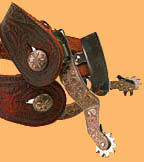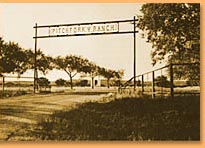

|
 |
"The Pitchfork's operations span around 180,000 acres in 2 states and more than a century of continuous operation under one family." On December 13, 1883 the Pitchfork Land and Cattle Company was incorporated with 52,500 acres of land in central West Texas and a foundation herd of 9,750 cattle. Unlike most ranches established during the great cattle boom of the 1880s, the Pitchfork survived episodes of drought and cattle depression for more than 100 years. No other ranch in central West Texas can boast being larger today than during its initial years. The Pitchfork home ranch covers 165,000 acres in Dickens and King counties near the town of Guthrie, Texas, with a satellite operation in Oklahoma. The Pitchfork is larger today than at any time in its history. Recently the Pitchfork sold its Flint Hills ranch in Kansas and purchased land in Jefferson county Oklahoma. In 1993 the Flag Ranch operation in Wyoming was sold. At that time the Pitchfork ranch acquired more land in Texas. Although the Pitchfork's operations have expanded and modernized, its core business remains the same: cattle. The Pitchfork cattle herd is primarily Black and Black Baldie cows. Cattle are selected for multiple traits that include both maternal and carcass characteristics. Pitchfork calves are all Source and Age verified and all are USDA process verified as NHTC (Non-Hormonally Treated) and All Natural. With around 4,500 mother cows grazing the home ranch, the cowboys have ample opportunity to work the range in a manner very similar to the cowboys who first rode for the brand. Pitchfork cowboys have always ridden good horses. The signature "Pitchfork Gray" -- a gray horse with a black mane and tail -- has now become as synonymous with the ranch as the brand itself. The Pitchfork's horses have become widely known because of the success they have had in multiple areas. For nearly 100 years the Pitchfork's profits and losses were affected only by the weather and the price of cattle. The Pitchfork Ranch is now a diversified modern agricultural business. Other areas of the ranches operation include oil exploration with significant finds in the Tannehill sands area. The Pitchfork has established hunting on the ranch, with guided hunts for deer, game birds, boar and other game. Farming has also been expanded in recent years to increase winter grazing and grain production. The Pitchfork has changed with the times, as change was necessary. However, it has never forgotten its past, never forgotten the traditions and ethic that allowed it to survive when many others failed. Helicopters and computers are now as common as ropes and saddles at the Pitchfork. But the ranch's cowboys eat at the same table as the ranch's cowboys did nearly a century before. Some things never change and never should. |

